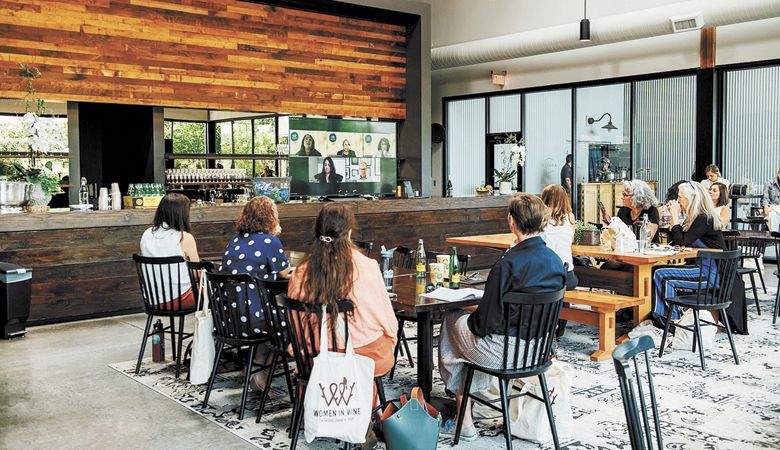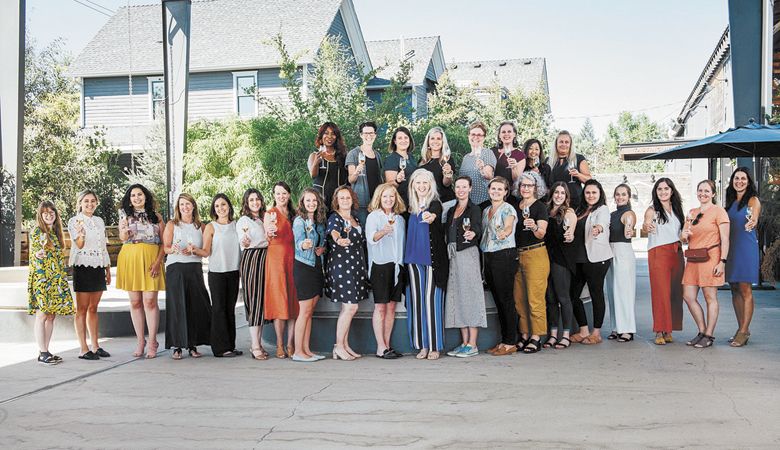Woman Up
Forum raises female voices
This July, Oregon’s Women in Wine (WIW) welcomed more than 300 people to its third annual conference, doubling attendance from last year. An in-person opportunity boosted the number for the online event, during which approximately 100 people enjoyed watch parties with complimentary food and wine at four locations: Irvine & Roberts Vineyards in Ashland, Argyle Winery in Dundee, Willamette Valley Vineyards in Turner and Mitchell Wine Group in Portland.
The idea of “Fermenting Change in Oregon” sprouted in 2015 following Susan Sokol Blosser’s participation in a national wine conference — filled with both men and women. Realizing the dearth of women-focused collaborative events, the Oregon wine pioneer saw an opportunity to help advance women in the wine industry through a targeted conference, which now has expanded into much more.
“[In addition to] a one-day event, we’ve added community events, a mentorship program and scholarships,” says Julie Dalrymple, vice president of WIW. “Our reach was wide this year with several people from out of state.” The extensive program, planned by a 20-member volunteer board, covered diversity, climate change, workshops on mindfulness and conflict, negotiating compensation, and power and its ramifications.
Professional golfer Cristie Kerr opened the conference with her wine story. After starting her eponymous winery in Napa Valley in 2008, Kerr partnered with winemaker Suzanne Pride Bryan to create Curvature, a philanthropic wine project supporting breast cancer research at Stanford University. The third highest moneymaker on the LPGA golf tour, Kerr has helped raise more than $250,000 for the cause in honor of her mother, aunt and godmother who battled the disease.
Moderated by Jen Pinto, vice president of Southern Glazer’s Wine & Spirits, “Making an Honest Commitment to Diversity” was led by Amelia Ransom, director of diversity at Avalara, a tax compliance software company. “We, as women, need to spend less time in justification of our existence,” she explains. “As long as we are in the proving stage, we cannot be fully present. Command the space. Reteach ourselves that we are okay to be in that space.”
When asked about resources to increase diversity, equity and inclusion, Ransom answered with some questions: “What is the goal? What would it look like? Once you see the goal, then you can identify resources. It’s important to have a common goal.” With that in mind, she says if a company wants to hire more people of color, you can do it. Ransom says, “It’s a question of culture. You need to have a culture than can sustain different people and thrive.”
Ransom recommended specific steps to becoming a better ally, including understanding what Black, Brown and Asian women want. In order to know that, you must befriend them. “It’s pressure over time,” Ransom says. “We’re making a diamond. Allow yourself to be uncomfortable.”
Editor-in-chief of Popular Science Corinne Iozzio moderated the discussion “Local Shifts; Global Transformation: Impacting Climate Change.”
Panelist Julia Jackson, a second-generation vintner of Jackson Family Wines, spoke on behalf of her family winery and Grounded, an environmental advocacy organization she established. “We need the planet to have a lawyer,” she explains. “We’re in both a climate and moral crisis. We must empower indigenous communities to steward the land.” Directing more funding to grassroots organizations is a forward step with understanding Native peoples and learning what they need from the land.
Panelist Katie Jackson, a senior vice president for corporate social responsibility at Jackson Family Wines, says one of the strong suits of the wine industry remains being “the storytellers for the ag industry. We get to be at the vanguard of climate storytelling.” In 2016, the Jackson family publicly announced 11 climate goals to achieve in five years; they accomplished nine. “We realized the key climate areas to focus on include: carbon, water, land use and farming, and social equity,” Katie Jackson says. “The carbon footprint hot spots for us are packaging, transportation and renewable energy.”
Ian Klaus, a senior fellow on global cities at the Chicago Council on Global Affairs, reacted to a question about bottom-up versus top-down initiatives. He says scaling policy that enables local solutions to expand by engaging collective organizations presents a new way to work quickly and efficiently.
Moderator Iozzio believes the wine industry can be a leader in this type of thinking because customers can so easily get involved. Katie Jackson agrees: “The interest level among our consumers has gone way up in the last two to three years.”
Following lunch, author Elizabeth Gilbert offered some creative tips to the attendees. She urged everyone to trust their intuition. “It’s the only secret to success that I know.” A helpful tool for tuning in? She suggests writing a letter to yourself from five different perspectives: from your fear, from enchantment, from persistence, from trust and from universal love.
Two simultaneous workshops following Gilbert’s session concerned mindfulness and conflict. The latter involved filling out a “true colors” personality quiz prior to the discussion. Moderator Cathy Mott, a professional leadership coach, outlined various ways people react to conflict based on individuals’ quiz results. Consultation and collaboration marked one end of the spectrum; avoidance and accommodation marked the other.
“Pay Up: Negotiating Your Total Package” offered concrete advice to successful salary negotiation. Kate Dixon, a professional coach and author of “Pay Up,” started with her “tool set,” which included information and resources — salary data, company information (benefits, culture, leadership) and expert advice.
Next, the “skill set.” Dixon explains, “Clarify what you really want, practice what to say and prepare great goodbyes.” She presented a four-part conversational recipe. First: Express delight. “I’m delighted to have the offer.” Second: Ask questions. “These should not be things that you can pick up from the offer letter.” Third: Make requests. “Negotiate base pay by comparing yourself to the market.” Fourth: End on a positive note by expressing confidence and appreciation. Dixon recommends suggesting a specific date for the next meeting.
Finally, Dixon discussed “mind set,” advising guests to not take it personally and to negotiate like you’re doing it for a friend. She adds, “Don’t defeat yourself.”
Julia Coney, a wine writer and consultant, led the final session, asking four panelists several questions about power: “When did you know that you had power and what’s its source? When did you feel powerless and what did you do? How are you using your power in terms of diversity and inclusion?” The presentation centered on ways individuals identify and use their power to influence people, to affect change and to support and encourage others.
The conference concluded with a hybrid Happy Hour — virtual and in-person — as attendees had much to discuss and even more to anticipate.












